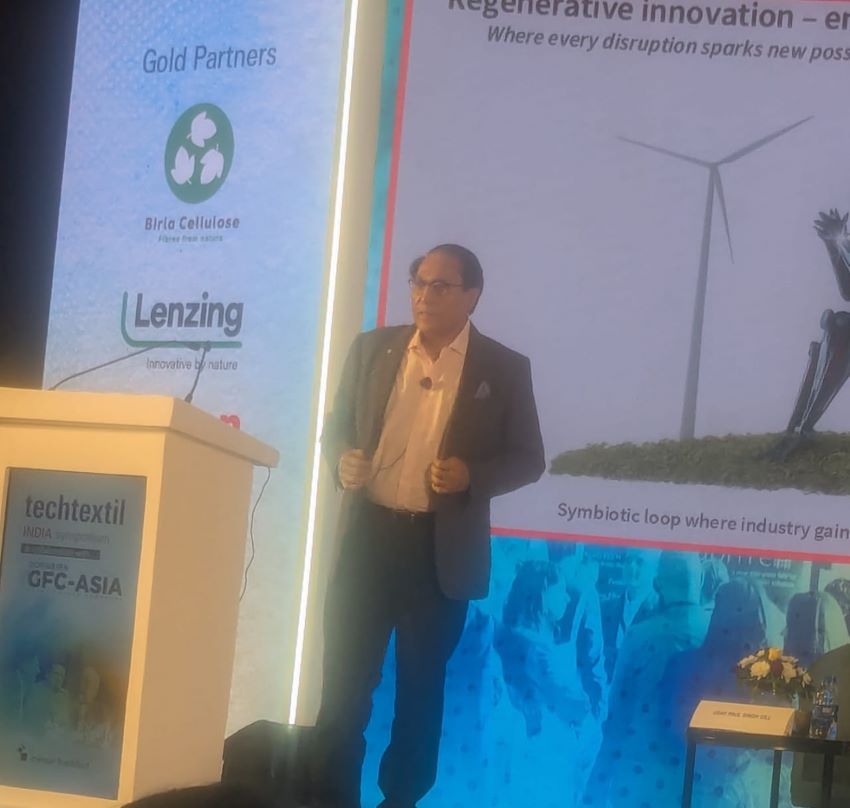FW
Several innovative solutions will be introduced by Bracker at ITMA trade fair for textile machinery to be held in Milan next month. Bräcker is the leading specialist for key components for ring spinning machines.
STARLETplus traveller is one of Bracker’s important innovations, which will be introduced at the exhibition. Also, BERKOL supergrinder with integrated Berkolizing unit (UV-treatment) for automatic grinding of ring, roving and air spinning top rollers is another innovation that will presented.
Bräcker will present others products as well— TITAN and ORBIT spinning rings, PYRIT and ZIRKON travellers, cost saving maintenance tools, and the well-known range of BERKOL cots and aprons.
The STARLETplus is said to offer additional benefits in challenging conditions such as high humidity or aggressive fibres—the traveller service life can be prolonged by up to 50 percent and due to its improved coating, the new traveller shows a better resistance against corrosion. Thus, the advantage is lower maintenance costs in the spinning mill and the new traveller is suitable for the entire yarn count range.
The BERKOL supergrinder is a modular machine that would improve the grinding capacity by more than 50 percent compared to the previous version. It boasts of a grinding capacity of up to 350 top rollers per hour and offers a storage capacity of 450 top rollers with 32 mm diameter. Besides, the power consumption is reduced by 10 percent and the machine ahs a touch panel for easy operation.
www.bracker.ch
A Trend and Technology Day of the Performance Days event will explore latest innovations and trends in sustainability. This starts off with highlights of the Performance Forum as part of Ulrike Arlt’s Functional Fabric Trends presentation and complemented by Nora Kühner’s Colour Trend presentation.
Many presentations and networking opportunities will be a part of the first day of the Performance Days, to be held on November 3 and 4 this year in Munich. Ulrike Arlt will start the day will the fabric presentation, informing about the latest performance trends in functional fabrics for the sports garment business and all novelties for winter 2017/18 along with giving an update of summer 2017 collections.
Nora Kühner, an experienced freelance fashion designer, will make a trend presentation giving detailed insight into the new seasons’ colour inspirations, with hints on fabric textures, surfaces, finishes, and graphics.
Sustainability will be the focus of the day and the highlight will be Sophie Bramel’s panel discussion with JRC Reflex, Regine IQtrim, 3M and Safe Reflections. They will discuss about the technology behind retro-reflection and what new developments may change the way these smart, light-catching materials are used.
The influence of sustainability on innovation will be discussed by Philipp Skal, Head of Global Sustainable Branding Solutions of Avery Dennison. There will be a technical presentation on innovative protection in apparel by Angela Walters, Brand Manager of XRD Impact Protection Technologies, while Peter Sjösten, Vice-President, Polygiene, will explore ways how the textile supply chain and the brands can reduce human footprint in washing and drying.
Rounding off, Hubertus Drinkuth, Managing Director of Systain Consulting will give a presentation on The Federal Ministry's Plans for the Textile Industry, where he will speak about Textiles Partnership, its objectives and goals.
www.performancedays.eu
Pakistan’s textile exports have dropped 14 per cent compared to last year. Pakistan is the eighth largest exporter of textiles in Asia. This sector contributes 9.5 per cent to GDP and provides employment to about 15 million people. The country is the fourth largest producer of cotton, with the third largest spinning capacity in Asia after China and India, and contributes five per cent to global spinning capacity.
The country’s textile exports consist mainly of raw cotton and low value added products. Other exports are of bed linen, towels and knitwear. Pakistan’s textile exporters want a special tariff and priority in supply of gas and power. They say the government should stop giving preference to exports of raw materials and should instead work for promoting apparel exports. They say raw cotton and combed and carded cotton should not be exported when these raw materials are needed by the value added domestic textile sector.
The sales tax rate has been increased by 50 per cent in the budget for 2015-16. This has blocked a huge amount of exporters’ liquidity. This in turn is expected to damp export figures in coming months. The country’s currency appreciation has also hit Pakistan’s textile exporters.
Indian entrepreneurs can invest in Bangladesh’s weaving sector. The country offers numerous opportunities as local weavers cannot meet the demand for fabric due to inadequate production capacity. Spinners are able to supply 90 per cent of the yarn needed for knitting sector, while weavers can meet only 40 per cent of the demand for fabric in the garment sector.
The garment sector in Bangladesh would benefit if Indian entrepreneurs set up weaving factories in Bangladesh as local businesses have to import fabrics at present, which is time consuming. India is looking for investment opportunities in the textiles sector. The total fabric requirement is about three billion yards, of which 85 to 90 per cent is imported from countries like China, India, Hong Kong, Singapore, Thailand, Korea, Indonesia and Taiwan. Fabric demand is increasing at the rate of 20 per cent per year.
Textiles and readymade garments represent a significant portion of Bangladesh’s economy, accounting for more than 60 per cent of the country's industrial labor force and more than 80 per cent of its annual exports by value.
Bangladesh is the world's second largest readymade garment exporter. It is courting investment to diversify its manufacturing base, currently focused on textiles, to include low end electronics and automobile assembly.
India is contemplating imposing an anti dumping duty on jute imports from Bangladesh and Nepal. The aim is to protect the domestic industry. Jute is a natural and an eco-friendly fiber, derived from the inner bark of the plant. Uses include: packaging, geo-textiles, protection of rooting plants, making of cloths, bags, wrappings, boots and shoe linings. It is also used to make ropes, strings, upholstery foundation, curtains and furnishing fabrics. Jute can also be mixed with wool for fine yarn and fabric production.
A subsidy of 7.5 per cent by Bangladesh for export has resulted in jute flooding the Indian market. Manufacturers in India want penal duties to be imposed on jute imported from across the border to nullify the impact of export subsidies given by Bangladesh, making its products cheaper here in the absence of import duty. The jute industry in India provides direct employment to 3.7 lakh workers and supports livelihood of 40 lakh rural families. Domestic demand dropped drastically during the Rabi marketing season 2014-15 due to higher carryover stock from the previous year.
Many states, including West Bengal, where most jute mills are located, are now increasingly plastic bags to pack agriculture produce, especially sugar. This has forced shut down of several jute mills while many others are working below capacity leading to workers’ unrest.
Indian firms plan to set up shop in Vietnam. At least four Indian enterprises are exploring investment opportunities in the textile and dyeing sector in Vietnam. Vietnam is expected to quickly increase its fabric production capacity to meet the rules of origin in free trade agreements. While the ratio of locally-produced fabrics is low, the yarn-forward rule in the Trans-Pacific Partnership trade deal and the fabric-forward rule in the free trade agreement between Vietnam and the European Union require Vietnam’s fabric production capacity to rise.
Vietnam is a big yarn producer with a production volume reaching more than 9,00,000 tons last year. But two-thirds of it is exported. With textiles and garment exports amounting to over $24 billion last year, Vietnam needs around 8.5 billion sq. mt. of fabric.
Vietnam plans to increase the proportion of locally-made fabric. Around three billion dollars of foreign capital have been pledged for Vietnam’s textile and dyeing in the past 18 months. Supporting policies in terms of land and wastewater treatment for enterprises investing in textile and dyeing facilities are necessary. To produce an additional five billion square meters of fabric, much land and investment would be needed for construction of production and wastewater treatment facilities.
Kingpins will be held in Amsterdam, October 28 and 29. About 50 denim specialists from Europe, the US and Asia are expected to attend. Several among the industry's major players are expected to take part, such as Advance Denim, Artistic Fabrics Mills, Arving, Blue Farm, Cone Denim, Denim Valley, Lenzing and Tavex. The professional gathering will feature many talks covering seasonal trends and the industry’s major innovations.
Besides an analysis of spring/summer 2016 fashion shows and the spring/summer 2017 denim trends, Invista will showcase its latest knit denim offerings, while a round table talk will be dedicated to the premium segment, both in its original and current meaning. Kingpins was founded by Andrew Olah and launched in 2004 in New York as an invitation-only, boutique denim sourcing show featuring select vendors that include denim and sportswear fabric mills from the US, Japan, China, India, Morocco, Pakistan, Egypt, Mexico and Europe, wash houses, full package manufacturers, trim providers and business solutions. Only the best brands are invited.
The trade show has acquired cult like status among denim professionals over the years. Kingpins grew into a platform with biannual editions in New York, Los Angeles and Hong Kong.
kingpinsshow.com/main/default/cities.aspx

 staying put in
staying put in
A look at the changing dynamics of luxury segment
Many luxury brands struggled in 2014 amid lower economic growth and political instability in developing markets. Several brands shifted their short-term attention back to growth opportunities in United States, which is rebounding nicely post-financial crisis. Still, developing markets remain long-term targets: Today, emerging markets comprise about 30 per cent of the global luxury market. And with wealth creation opportunities and the fast growth in the number of high-net-worth individuals, developing markets will continue to grab share. In this year's special feature, the report examines luxury in the GRDI top 30 markets and discusses how luxury brands are adapting their strategies in order to succeed in a diverse and evolving landscape.
To understand the level of luxury development in emerging markets, report analyzed 15 leading luxury brands — the ‘Luxury 15’—and their standalone store presence in the GRDI's top 30 countries. In general, brands' presence in countries tends to increase with the size of the wealthy population and is an indicator of the ability and predisposition of local consumers to buy luxury. Emerging markets fall into three tiers of development, with different implications for brands looking to enter or expand in the markets.
Established luxury markets are Brazil, China, Kuwait, Malaysia, Qatar, Russia, Saudi Arabia, Turkey, and the UAE, Middle of the pack luxury destinations include Azerbaijan, Colombia, Jordan, Kazakhstan, Mexico, India, Indonesia, Panama, and the Philippines and emerging luxury markets include Angola, Botswana, Chile, Mongolia, Nigeria, Oman, Peru, Sri Lanka, and Uruguay. The report indicates that opportunities for luxury abound in developing markets; however luxury brands' strategies have to be tailored to the local market to succeed. To minimize risk, established luxury markets such as China and the UAE are safe yet competitive environments. In mid-tier markets such as India, players need to actively build their brands and be ready to pounce once luxury real estate becomes available. For those that are more intrepid, breaking ground in new frontiers could pay off big in the long run if they can get past the initial challenges. Following is a closer look at these three tiers of markets.
Developing markets hold exciting prospects
The 2015 GRDI reflects a retail environment in developing markets filled with exciting challenges. The role of these markets sources of growth, it says, continues to entice global retailers, which are still investing in building a long-term advantage. Even as they become more selective in their expansion strategies in new frontiers, they are clearly committing to the long haul.
www.atkearney.com
Bilateral trade between India and China has grown manifold in recent times. India has emerged as the seventh largest export destination for China.
India’s import list of more than 200 items from China is mostly dominated by textiles, smart phones, LED, electrical and electronic equipment, machinery, boilers, organic chemicals, plastics, furniture, lighting, paper and paperboard, glass and glassware.
In the home life segment, the most popular imported items were furniture and lighting equipments to the tune of $6747.40 million in 2014 compared to $6014.60 million in 2013. Similarly, the import value of plastic and plastic items was $1716.90 million as against $1255 million in 2013. The value of Chinese imports in glass and glassware segment for 2014 was $296.60 million while the import value of paper and paper boards and pulp articles was $382.50 million.
A Chinese business delegation comprising 600 leading textile and manufacturers and traders of electronics and furniture is headed for a three-day business trip to India in December. The delegation is scheduled to visit Ahmedabad, Mumbai, Indore, Nagpur and Pune.
The Chinese manufacturers and traders are expected to interact with more than 25,000 Indian traders and captains of Indian industry.
The Cotton Textile Export Promotion Council (TEXPROCIL), a Government of India Enterprise has granted Indo Count Industries the silver trophy for the second highest exports of made-ups in ‘Bed Linen / Bed Sheets / Quilts’, under the Category - III for the year 2014/15.
Earlier, the company was at the third position, and now, with this trophy, it has becomes the second largest manufacturer exporter of bed linen, bed sheets and quilts from India.
The company prides itself of being a blend of quality, expertise and technology it adheres to, to create incomparable standards for finest textile trends, product innovation and world class infrastructure. It also has the ability to explore and support the innovation and creation of new textile products and functionalities.
Indo Count delivers products with the fusion of best techniques, technologies and impeccable minds. It has always put in efforts to be updated about the dynamic and ever-demanding needs of the market. Therefore, it has evolved as a diversified manufacturer of world-class bed linen in different qualities and 100 per cent cotton and blended yarn.
www.indocount.com












